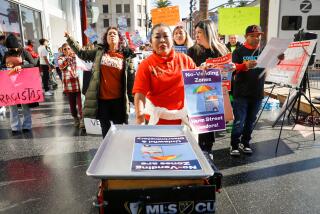SOUTH : Court Ruling Buoys Liquor Store Foes
- Share via
Calling it a major victory in the battle to regain control of their communities, a coalition of residents and lawmakers welcomed a court decision that upholds the city’s post-riot crackdown on liquor store operations.
On March 17, the 2nd District Court of Appeal upheld the city’s right to impose restrictions on liquor stores rebuilt after the 1992 civil unrest as part of a city zoning ordinance that requires some owners to hire security guards and puts limits on the hours of liquor sales.
Since 1987, the city has required conditional-use permits for liquor sales in South-Central. After the riots, the city applied those requirements to land-use applications for store owners who wanted to rebuild.
About 200 liquor stores, most of them minimarkets, were destroyed during the unrest.
“We’re ecstatic at this victory, because all along we’ve championed the residents’ rights to use the public hearing process to correct the environmental problems liquor stores have created,” said Sylvia Castillo, project director for the Community Coalition for Substance Abuse Prevention and Treatment, a nonprofit group with more than 500 members.
The decision also drew support from Councilman Mark Ridley-Thomas and Councilwoman Rita Walters, whose 8th and 9th districts include South-Central.
“This sends a significant message to those who would attempt to disarm the city” from enforcing land-use requirements, Ridley-Thomas said.
But Walters cautioned that the decision may result in a stepped-up challenge by the alcohol industry.
“I would not be at all surprised if the decision strengthens the efforts of the alcohol lobbyists to find some kind of loophole to challenge the court’s decision,” she said.
Attorneys for the Korean American Legal Advocacy Foundation, the group that along with two liquor store owners filed the appeal, said they hope to appeal the decision.
“We’re obviously disappointed,” said attorney Stephen L. Jones. “But this was a case that was bound for the (state) Supreme Court.
“The real blow is, perhaps, that it’s been 23 months since the riots, and of the 175 Korean stores that were destroyed, only six have come back.”
Jones, who also represents plaintiffs in seven other lawsuits involving liquor store permits, said he expects to proceed with those cases. “We have individual cases with individual conditions that we’re challenging,” he said.
Paul Tellez, who has attended public hearings on the liquor store issue, was one resident pleased by the ruling.
“This means we have a better chance of keeping our streets safe,” said Tellez, who lives on 22nd Street.
“Before the liquor store on my corner burned, we had the police coming down there up to five times a day. The next day after the riots, we didn’t have the problem.”
More to Read
Sign up for Essential California
The most important California stories and recommendations in your inbox every morning.
You may occasionally receive promotional content from the Los Angeles Times.













